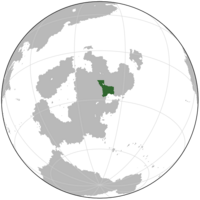Onotene
Free Chiefs of Onotene | |
|---|---|
| Anthem: Hail to the Chief | |
 | |
| Capital | Canandaigua |
| Official languages | Onotenian Daganian |
| Ethnic groups (2022) |
|
| Religion (2016) |
|
| Demonym(s) | Onotenine Onotenian |
| Government | Federal tribal confederacy |
| Ontig Keru | |
| Ontig Meru | |
| Legislature | Assembly of Clans |
| Establishment | |
• Independence | 4 July 1985 |
| 2 April 1991 | |
| Area | |
• Total | 573,499 km2 (221,429 sq mi) |
| Population | |
• 2019 estimate | 3,800,000 |
• 2016 census | 3,712,544 |
• Density | 6.47/km2 (16.8/sq mi) |
| GDP (nominal) | 2022 estimate |
• Total | |
• Per capita | |
| Gini (2022) | medium |
| HDI (2022) | high |
| Currency | De Jure Onotenine Ont (Ø) De Facto Galian Shekel ($) Yawathan Yenaholi (¥) |
| Date format | dd-mm-yyyy |
| Driving side | right |
| Calling code | +963 |
| ISO 3166 code | OT |
| Internet TLD | .ot |
Onotene, officially the Free Chiefs of Onotene, is a country in western eastern Galia. It is a federal state, with individual clans making up the domestic political units of the country. These clans, presided over by a chief, are autonomous within their own borders. Their chiefs make up the Onotenine executive council, the Assembly of Clans. This system of government makes Onotene one of the few de jure oligarchies on the planet. The country covers over 574,000 square kilometers, mostly dry desert, resulting in a very sparesely populated area. The capital and largest city is Canandaigua, on the shores of the Daigua Lake. Onotene is bordered to the west by Onhsanenea, the north by Dumatina, Louisiana and Janolia to the east, and the Naossian Gulf to the south. It's population of 3.8 million primarily lives around the Daigua Lake.
Like much of the territories in that part of Galia, what is now Onotene was independent for several centuries, primarily populated by nomadic desert-dwellers called Daganians. These nomadic tribes would be absorbed into the Dilanoyawathan Empire as the province of Dumatina-Onotene. During the collapse of the Yawathan National Republic, the province of Dumatina-Onotene would go independent but a brutal civil war in the 1990s led to the division of the province off of more or less ethnic grounds. Unlike other post-Yawathan states, Onotene never experienced a period of democracy, but rather implemented a tribal federation controlled by hereditary chiefdoms. International observers have labeled Onotene as an authoritarian state with limited civil rights.
Onotene, while poor, has escaped much of the crushing poverty of its nieghbors. This is due in part because of access to one of the largest sources of fresh water in the otherwise dry Galian interior. In addition, the economy is buoyed by natural resource extraction, concentrated in mining operations in the west, with the Onotenine mountains representing some of the largest deposits of minerals in Galia. However, the country experienced a currency collapse in the mid 2010s. While the ont has officially recovered, the Galian shekel and Yawathan yenaholi are still commonly used as the ont remains distrusted by much of the population. The country is a member of the Global Community and the Mutual Defense Pact.

